The key to Restorative Rest 🌙
A good sleep hygiene is essential for restorative rest and general well-being.
Unfortunately, in our modern world full of digital distractions, daily stress and hectic lifestyles, it's easy to overlook this fundamental component of our health. This article explores best sleep hygiene practices to improve the quality of nocturnal rest and optimize recovery.

What is Sleep Hygiene? 🤔
L'sleep hygiene refers to all the habits and practices that promote quality sleep. It's not just about the quantity of sleep, but also its quality. Good sleep helps maintain mental health, physicsand emotionalreinforces immune systemimproves concentrationand optimizes physical performance.



Why is Sleep Hygiene Important? 🌟
- Physical and mental recovery Sleep is the time when the body repairs damaged tissue, consolidates memory and regenerates cells. Poor sleep hygiene can disrupt this process, leading to chronic fatigue, memory problems and reduced cognitive performance.
- Hormonal balance Insufficient or poor-quality sleep can deregulate appetite-related hormones such as ghrelin and leptin, increasing the risk of weight gain and metabolic disorders.
- Stress Reduction Good sleep helps regulate stress hormones such as cortisol, improving mood and stress management.
8 Tips to Improve Sleep Hygiene 🛏️
- Maintain a regular schedule ⏰
Going to bed and getting up at the same time every day, even at weekends, helps regulate the body's internal clock and promotes faster sleep. - Creating a Sleep-Friendly Environment 🌜
The bedroom should be a sanctuary for rest. Keeping the room dark, quiet and cool can greatly improve sleep quality. Using blackout curtains, earplugs or a white noise machine can help. - Limit exposure to blue light before bedtime 📱
Blue light from screens (phone, tablet, computer) disrupts the production of melatonin, the hormone that induces sleep. Limiting exposure to these screens at least one hour before bedtime is essential. - Avoid heavy meals and caffeine 🍔☕
Eating heavy or spicy meals before bedtime can cause discomfort and disrupt sleep. Similarly, caffeine and alcohol should be avoided at the end of the day, as they can alter sleep cycles.




5. Practice Relaxation Techniques 🧘
Meditation, deep breathing or gentle stretching can help calm the mind and prepare the body for sleep. Practices such as yoga nidra are known for their relaxing effects.
6. Exercise Regularly 🏃
Regular physical exercise, ideally during the day, helps to improve sleep quality. However, it's best to avoid intensive sessions too close to bedtime, as they can increase alertness.
7. Use Quality Products like those from IAKOTA 🛌
Visit IAKOTA mattress topper and night masks use the patented Minoxis technology to promote deep, restful sleep. Visit mattress topper uses metal oxides to reflect infrared emitted by the body, stimulating microcirculation. This helps reduce oxidative stress and improve sleep quality. Visit night masks effectively block light, promoting melatonin production and rapid sleep.
8. Managing Stress and Anxiety 🧠
Anxiety and stress are enemies of sleep. Keeping a gratitude journal, talking about worries with a friend or therapist, and practicing mindfulness can help manage stress and promote quality sleep.
Conclusion
L'sleep hygiene is a key element in a healthy, balanced life. By adopting appropriate sleep practices and using innovative products such as those from IAKOTAIt is possible to significantly improve sleep quality, and consequently quality of life.
Discover more tips and products to optimize your sleep on our site.

